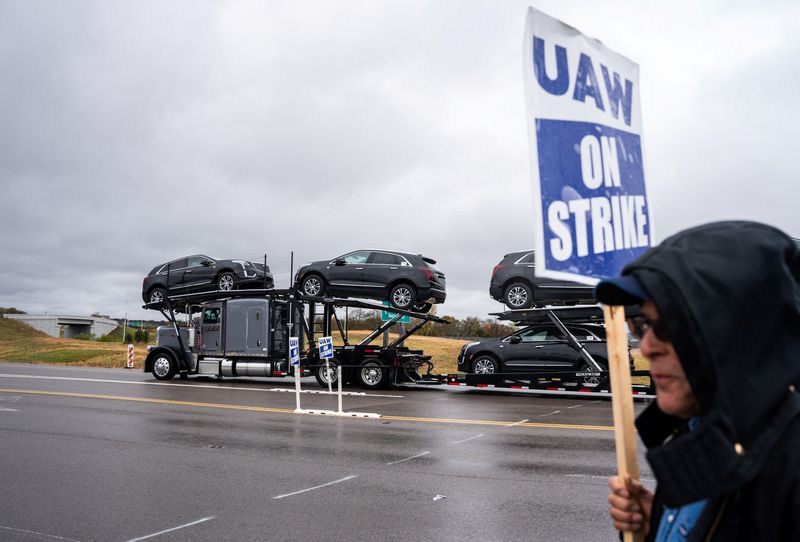By David Shepardson and Nathan Gomes
WASHINGTON (Reuters) -Workers belonging to the United Auto Workers (UAW) at General Motors (NYSE:GM)' Spring Hill plant in Tennessee voted against a proposed contract, even as the union's president said in Washington on Tuesday that the deal remains on track for approval.
Each facility's union local must vote on the tentative deal, but only the overall combined vote count determines the outcome. Of the total votes cast at Spring Hill, 68% were against the agreement.
UAW President Shawn Fain told reporters on Capitol Hill that early voting was trending positive. "Early results are very favorable," he said.
The UAW GM vote tracking site currently shows the contract leading by a 52% to 48% margin with about 16,000 votes cast out of about 46,000 UAW-represented GM workers.
Union workers are voting on contracts from each of Chrysler-owner Stellantis (NYSE:STLA), GM and Ford Motor (NYSE:F), after the first coordinated strike against Detroit's Big Three automakers ended late last month.
About 81% of UAW workers at Stellantis have voted yes, while 66% of Ford workers have voted to approve, the UAW said.
Fain said he is holding meetings this week in Washington about the union's aggressive plans to organize nonunion auto plants. He said Tesla (NASDAQ:TSLA) workers were reaching out expressing interest in unionizing along with workers from Toyota (NYSE:TM), Hyundai (OTC:HYMTF), Honda (NYSE:HMC), Nissan (OTC:NSANY) and others.
"We have a team of people we are working with to discuss next steps," Fain said. "We have some very smart people that are going to put that plan together with us."
GM's Spring Hill factory employs 3,932 workers and makes the Cadillac XT5 and XT6 SUVs, among other vehicles.
The UAW's new agreement with GM grants a 25% increase in base wage through April 2028 and will cumulatively raise the top wage by 33%, compounded with estimated cost-of-living adjustments to over $42 an hour.

Automakers were previously slashing costs and navigating a bumpy road to manufacture EVs and catch up with market leader Tesla, but lower margins on those vehicles have deterred them from accelerating the move.
GM in October also pulled its full-year profit forecast due to the strike and postponed a $4 billion electric truck plant in Michigan.